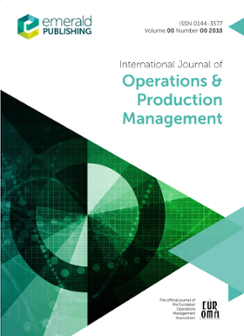Boundary negotiations: a paradox theoretical approach for efficient and flexible modular systems
IF 7.1
2区 管理学
Q1 MANAGEMENT
International Journal of Operations & Production Management
Pub Date : 2021-05-10
DOI:10.1108/IJOPM-08-2020-0543
引用次数: 7
Abstract
PurposeThe purpose of this paper is to explore the interplay between firm boundary decisions and the management of both efficiency and flexibility and the implications this has for modular design in the provision of advanced services.Design/methodology/approachA single case study in the defence industry employs semi-structured interviews supplemented by secondary data. Data are analysed using thematic analysis.FindingsThe findings provide a process model of boundary negotiations for the design of efficient and flexible modular systems consisting of three phases; boundary ambiguity, boundary defences and boundary alignment.Practical implicationsThe study provides a process framework for boundary negotiations to help organisations navigate the management of both-and efficiency and flexibility in the provision of advanced services.Originality/valueDrawing upon modularity, paradox and systems theory, this article provides novel theoretical insight into the relationship between firm boundary decisions and the management of both-and efficiency vs. flexibility in the provision of product upgrade services.边界协商:一种高效灵活模块化系统的悖论理论方法
本文的目的是探讨企业边界决策与效率和灵活性管理之间的相互作用,以及这对提供先进服务的模块化设计的影响。设计/方法/方法在国防工业中进行的单个案例研究采用半结构化访谈并辅以二手数据。数据分析采用专题分析。研究结果为高效灵活的模块化系统设计提供了一个边界协商的过程模型;边界模糊,边界防御和边界对齐。实际意义这项研究为边界谈判提供了一个程序框架,以帮助机构在提供先进服务时兼顾效率和灵活性的管理。本文运用模块化理论、悖论理论和系统理论,对企业边界决策与两者管理之间的关系以及产品升级服务提供中的效率与灵活性之间的关系提供了新颖的理论见解。
本文章由计算机程序翻译,如有差异,请以英文原文为准。
求助全文
约1分钟内获得全文
求助全文
来源期刊
CiteScore
13.30
自引率
17.20%
发文量
96
期刊介绍:
The mission of the International Journal of Operations & Production Management (IJOPM) is to publish cutting-edge, innovative research with the potential to significantly advance the field of Operations and Supply Chain Management, both in theory and practice. Drawing on experiences from manufacturing and service sectors, in both private and public contexts, the journal has earned widespread respect in this complex and increasingly vital area of business management.
Methodologically, IJOPM encompasses a broad spectrum of empirically-based inquiry using suitable research frameworks, as long as they offer generic insights of substantial value to operations and supply chain management. While the journal does not categorically exclude specific empirical methodologies, it does not accept purely mathematical modeling pieces. Regardless of the chosen mode of inquiry or methods employed, the key criteria are appropriateness of methodology, clarity in the study's execution, and rigor in the application of methods. It's important to note that any contribution should explicitly contribute to theory. The journal actively encourages the use of mixed methods where appropriate and valuable for generating research insights.

 求助内容:
求助内容: 应助结果提醒方式:
应助结果提醒方式:


